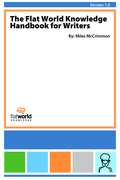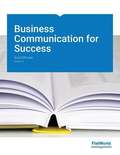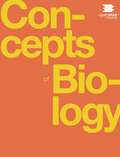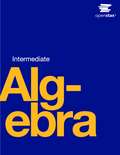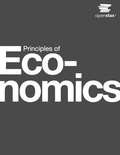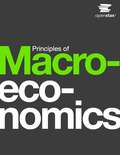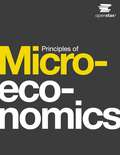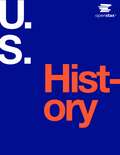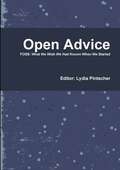Special Collections
Free Upskilling Books for All!
- Table View
- List View
How to Use Microsoft® Excel®
by Joseph M. ManzoHow to Use Microsoft® Excel® The Careers in Practice Series is an textbook appropriate for a course covering Microsoft Excel at a beginner to intermediate level. It is geared toward and will be accommodating for students and instructors with little to no experience in using Microsoft Excel. However, the approach is not at the expense of relevance. How to Use Microsoft® Excel® The Careers in Practice Series approaches Excel from the perspective of making personal and professional quantitative decisions. Personal decisions include big purchases such as homes and automobiles, savings for retirement, and personal budgets. Professional decisions include budgets for managing expenses, merchandise items to markdown or discontinue, and inventory management.
The Flat World Knowledge Handbook for Writers
by Miles MccrimmonAre you teaching freshman level students? Is this one of the first college level courses your students have ever taken? Probably. That is why this English Handbook is different (and we think better). Miles McCrimmon's, The Flat World Knowledge Handbook for Writers is based on the understanding that writing is at the center of the college experience, not just something students do on their way to "higher-level" coursework. The Flat World Knowledge Handbook for Writers supports the goal of acculturating entering students to the demands of college-level thinking and writing, whether that goal is being met through coursework in Composition, Student Development, or some combination of the two.
Business Communication for Success
by Scott McleanThis book is suited for Business Communication courses, but is also appropriate for Business English, Business Presentation, Professional Communication courses. Scott McLean brings his authoring expertise to this new communications textbook. Scott has authored textbooks in the areas of Speech Communication, Interpersonal Communication and Public Speaking. Business Communications for Success benefits from Scott's extensive understanding of how students learn the art of effective communication. Students are provided ample opportunity to engage with the concepts, vocabulary and models covered in the text, including role-playing exercises, journal writings, case studies, small-group activities, games, and self-assessment activities.
Business Communication for Success
by Scott McleanThis book is suited for Business Communication courses, but is also appropriate for Business English, Business Presentation, Professional Communication courses. Scott McLean brings his authoring expertise to this new communications textbook. Scott has authored textbooks in the areas of Speech Communication, Interpersonal Communication and Public Speaking. Business Communications for Success benefits from Scott's extensive understanding of how students learn the art of effective communication. Students are provided ample opportunity to engage with the concepts, vocabulary and models covered in the text, including role-playing exercises, journal writings, case studies, small-group activities, games, and self-assessment activities.
Business English for Success
by Scott McleanBusiness English for Success is a creative solution to a common challenge across Business Communication courses: Business English or Business Presentations? Some classes place an equal emphasis on oral and written communication. If that's the case for you check out our free online text Business Communication for Success. If, however, your class places the emphasis squarely on written communication and writing proficiency, then Business English for Success is for you. Business English for Success provides instruction in steps, builds writing, reading, and critical thinking, and combines comprehensive grammar review with an introduction to paragraph writing and composition. This step-by-step approach provides a clear path to student-centered learning. A wide range of writing levels and abilities are addressed, helping each student prepare for the next writing or university course.
Writing for Success
by Scott McleanScott McLean's Writing for Success is a text that provides instruction in steps, builds writing, reading, and critical thinking, and combines comprehensive grammar review with an introduction to paragraph writing and composition. Beginning with the sentence and its essential elements, this book addresses each concept with clear, concise and effective examples that are immediately reinforced with exercises and opportunities to demonstrate, and reinforce, learning.
Leading with Cultural Intelligence
by Mai MouaLeading with Cultural Intelligence outlines the important concepts of cultural intelligence (CI) and the steps that must be practiced to become a culturally intelligent leader. CI is both a strategy and a tool that leaders can use to gain more confidence and proficiency when working across cultures. This book outlines the importance of understanding culture and its impact on organizations, the strategic value of cultural intelligence, and the significance of integrating and practicing cultural intelligence in everyday business life. When all these aspects are properly integrated and applied in the leadership and management process, organizations are more innovative and adaptable to respond to cultural changes.
Anatomy & Physiology
by OpenStaxHuman Anatomy and Physiology is designed for the two-semester anatomy and physiology course taken by life science and allied health students. The textbook follows the scope and sequence of most Human Anatomy and Physiology courses, and its coverage and organization were informed by hundreds of instructors who teach the course. Instructors can customize the book, adapting it to the approach that works best in their classroom. The artwork for this textbook is aimed focusing student learning through a powerful blend of traditional depictions and instructional innovations. Color is used sparingly, to emphasize the most important aspects of any given illustration. Significant use of micrographs from the University of Michigan complement the illustrations, and provide the students with a meaningful alternate depiction of each concept. Finally, enrichment elements provide relevance and deeper context for students, particularly in the areas of health, disease, and information relevant to their intended careers.
Biology
by OpenStaxBiology is designed for multi-semester biology courses for science majors. It is grounded on an evolutionary basis and includes exciting features that highlight careers in the biological sciences and everyday applications of the concepts at hand. To meet the needs of today's instructors and students, some content has been strategically condensed while maintaining the overall scope and coverage of traditional texts for this course. Instructors can customize the book, adapting it to the approach that works best in their classroom. Biology also includes an innovative art program that incorporates critical thinking and clicker questions to help students understand--and apply--key concepts.
College Physics
by OpenStaxThis introductory, algebra-based, two-semester college physics book is grounded with real-world examples, illustrations, and explanations to help students grasp key, fundamental physics concepts. This online, fully editable and customizable title includes learning objectives, concept questions, links to labs and simulations, and ample practice opportunities to solve traditional physics application problems.
Concepts of Biology
by OpenStaxConcepts of Biology is intended for the introductory biology course for non-science majors taught at most two- and four-year colleges. The scope, sequence, and level of the program are designed to match typical course syllabi. This text includes interesting features that make connections between scientific concepts and the everyday world of students. Concepts of Biology conveys the major themes of biology, such as a foundation in evolution, and features a rich and engaging art program.
Intermediate Algebra
by OpenStax"Intermediate Algebra is designed to meet the scope and sequence requirements of a one-semester Intermediate algebra course. The book's organization makes it easy to adapt to a variety of course syllabi. The text expands on the fundamental concepts of algebra while addressing the needs of students with diverse backgrounds and learning styles. Each topic builds upon previously developed material to demonstrate the cohesiveness and structure of mathematics."--Open Textbook Library.
Intermediate Algebra
by OpenStax"Intermediate Algebra is designed to meet the scope and sequence requirements of a one-semester Intermediate algebra course. The book's organization makes it easy to adapt to a variety of course syllabi. The text expands on the fundamental concepts of algebra while addressing the needs of students with diverse backgrounds and learning styles. Each topic builds upon previously developed material to demonstrate the cohesiveness and structure of mathematics."--Open Textbook Library.
Introduction to Sociology
by OpenStaxIntroduction to Sociology was written by teams of sociology professors and writers and peer-reviewed by college instructors nationwide. The textbook was developed for OpenStax College as part of its Open Educational Resources initiative. This free online text meets standard scope and sequence requirements and incorporates current events such as the Occupy Wall Street movement. The text is designed for the Introduction to Sociology course at any two- to four-year school.
Introductory Statistics
by OpenStaxIntroductory Statistics is intended for the one-semester introduction to statistics course for students who are not mathematics or engineering majors. It focuses on the interpretation of statistical results, especially in real world settings, and assumes that students have an understanding of intermediate algebra. In addition to end of section practice and homework sets, examples of each topic are explained step-by-step throughout the text and followed by a Try It problem that is designed as extra practice for students. This book also includes collaborative exercises and statistics labs designed to give students the opportunity to work together and explore key concepts. To support today's student in understanding technology, this book features TI 83, 83+, 84, or 84+ calculator instructions at strategic points throughout. While the book has been built so that each chapter builds on the previous, it can be rearranged to accommodate any instructor's particular needs.
Precalculus
by OpenStaxPrecalculus is intended for college-level Precalculus students. Since Precalculus courses vary from one institution to the next, we have attempted to meet the needs of as broad an audience as possible, including all of the content that might be covered in any particular course. The result is a comprehensive book that covers more ground than an instructor could likely cover in a typical one- or two-semester course; but instructors should find, almost without fail, that the topics they wish to include in their syllabus are covered in the text. Many chapters of Openstax Precalculus are suitable for other freshman and sophomore math courses such as College Algebra and Trigonometry; however, instructors of those courses might need to supplement or adjust the material. Openstax will also be releasing a College Algebra and Trigonometry title tailored to the particular scope, sequence, and pedagogy of those courses.
Principles of Economics
by OpenStaxPrinciples of Economics covers the scope and sequence for a two-semester principles of economics course. The text also includes many current examples, including; discussions on the great recession, the controversy among economists over the Affordable Care Act (Obamacare), the recent government shutdown, and the appointment of the United States’ first female Federal Reserve chair, Janet Yellen. The pedagogical choices, chapter arrangements, and learning objective fulfillment were developed and vetted with feedback from educators dedicated to the project. The outcome is a balanced approach to micro and macro economics, to both Keynesian and classical views, and to the theory and application of economics concepts. Current events are treated in a politically-balanced way, as well.
Principles of Macroeconomics
by OpenStaxPrinciples of Macroeconomics covers the scope and sequence for a one-semester economics course. The text also includes many current examples, including: the housing bubble and housing crisis, Zimbabwe’s hyperinflation, global unemployment, and the appointment of the United States’ first female Federal Reserve chair, Janet Yellen. The pedagogical choices, chapter arrangements, and learning objective fulfillment were developed and vetted with feedback from educators dedicated to the project. The outcome is a balanced approach to economics, to both Keynesian and classical views, and to the theory and application of economics concepts. Current events are treated in a politically-balanced way, as well.
Principles of Microeconomics
by OpenStaxPrinciples of Microeconomics covers the scope and sequence for a one-semester economics course. The text also includes many current examples, including; the Keystone Pipeline, Occupy Wall Street, and debates over the minimum wage. The pedagogical choices, chapter arrangements, and learning objective fulfillment were developed and vetted with feedback from educators dedicated to the project. The outcome is a balanced approach to economics and to the theory and application of economics concepts. Current events are treated in a politically-balanced way, as well.
U. S. History
by OpenStaxThis textbook has been created with several goals in mind: accessibility, customization, and student engagement-all while encouraging students toward high levels of academic scholarship. Instructors and students alike will find that this textbook offers a strong foundation in U.S. history in an accessible format. About U.S. History U.S. History has been developed to meet the scope and sequence of most introductory U.S. History courses. At the same time, the book includes a number of innovative features designed to enhance student learning. Instructors can also customize the book, adapting it to the approach that works best in their classroom.
Open-Advice
by Lydia PintscherOpen Advice is a knowledge collection from a wide variety of Free Software projects. It answers the question what 42 prominent contributors would have liked to know when they started so you can get a head-start no matter how and where you contribute.
Research Methods in Psychology
by Paul C. PriceYears before this book was a Flat World Knowledge textbook, Paul Price wrote an extensive series of handouts to replace the textbook he had been using for his psychological research methods course, and he posted them online for his students. The advantages of this were that 1) students had a streamlined presentation of the most important methodological concepts in psychology, and 2) they could access it online for free. Paul turned his book into a proper textbook by having it reviewed, edited and published with the full set of ancillaries by Flat World Knowledge so not only could his students get the materials for free, but so could yours. Although the content of Research Methods in Psychology is fairly traditional--making it easy for you to use with your existing courses--it also emphasizes a fundamental idea that is often lost on undergraduates: research methods are not a peripheral concern in our discipline; they are central. This why the overarching goal of this textbook is to present the basics of psychological research methods--focusing on the concepts and skills that are most widely shared within the discipline--emphasizing both their centrality to our field and their contribution to our understanding of human behavior. The book will include several features that will help accomplish this overarching goal. The Core Concepts: Dr. Price based his choices about content and terminology on the most influential original books and articles in the research methodology literature--as determined by an empirical analysis of the reference lists of secondary sources. He also relied on the Undergraduate Psychology Major Learning Goals and Outcomes document commissioned by the APA. Although many of the research methods outcomes in that document are addressed in all research methods textbooks (e.g., "Describe how various research designs address different types of questions and hypotheses"), others are rarely mentioned (e.g., "Recognize the limitations of applying normative conclusions to individuals"). The Examples: The text includes examples drawn from the entire range of contemporary psychology, including abnormal, clinical, and counseling psychology. Dr. Price also chose examples to show how psychological research has fundamentally changed what we believe to be true about human behavior (for example, in the area of eyewitness memory). The Style: Dr. Price concentrated on making the style of this book both straightforward and engaging. If you are looking for a new research methods textbook for your psychology course that has been used by "teachers" and is thorough in its content, you will find your book in Paul Price's Research Methods in Psychology. Order a desk copy and see for yourself.
Principles of Marketing version 2.0
by Jeff Tanner and Mary Anne RaymondPrinciples of Marketing Version 2.0 by Tanner and Raymond teaches the experience and process of actually doing marketing - not just the vocabulary. It carries five dominant themes throughout in order to expose students to marketing in today's environment:
Elementary Algebra
by John ReddenIt is essential to lay a solid foundation in mathematics if a student is to be competitive in today's global market. The importance of algebra, in particular, cannot be overstated as it is the basis of all mathematical modeling used in applications found in all disciplines. Traditionally, the study of algebra is separated into a two parts, Elementary and Intermediate Algebra. This textbook by John Redden, Elementary Algebra, is the first part written in a clear and concise manner, making no assumption of prior algebra experience. It carefully guides students from the basics to the more advanced techniques required to be successful in the next course.

